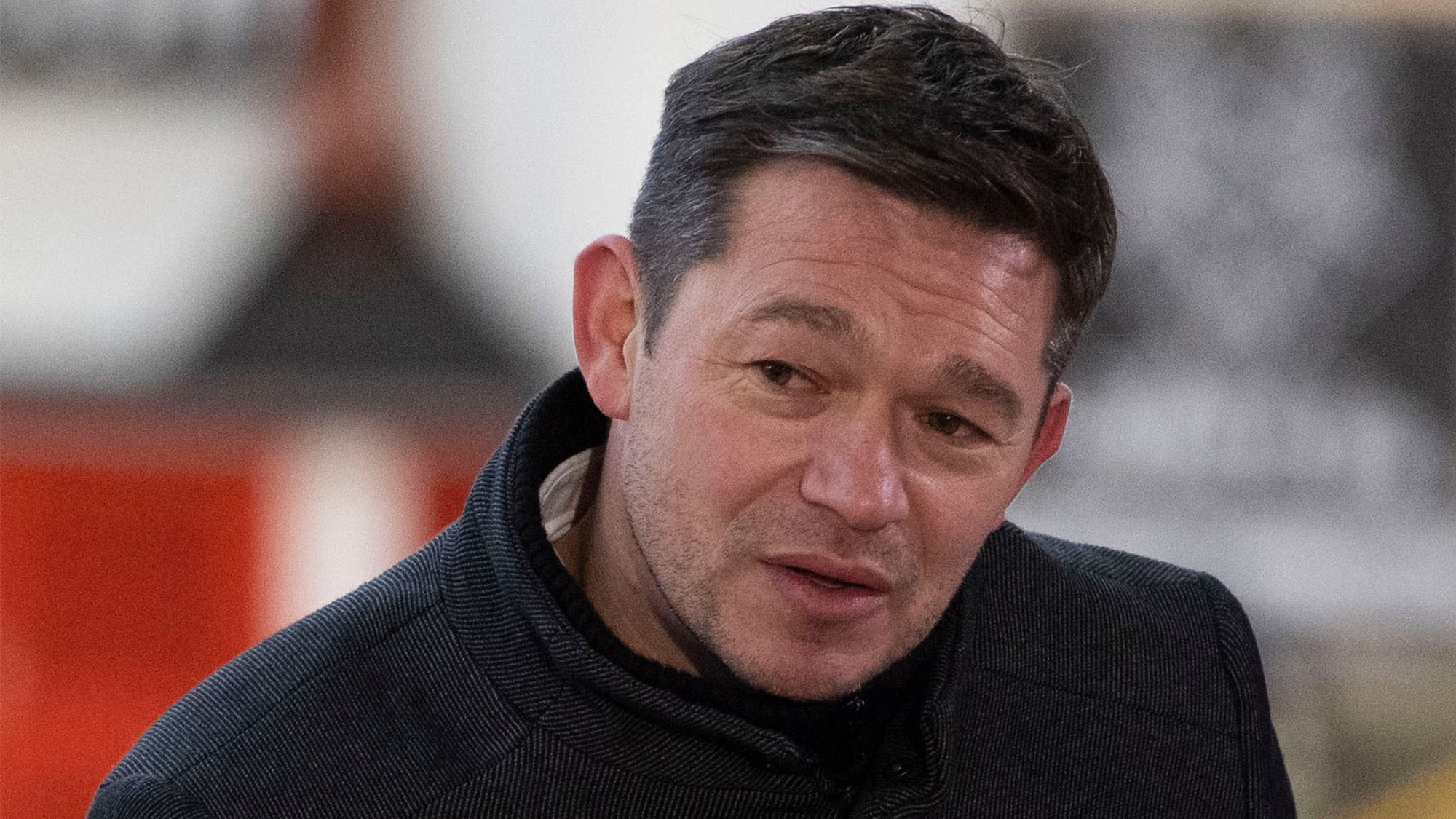News
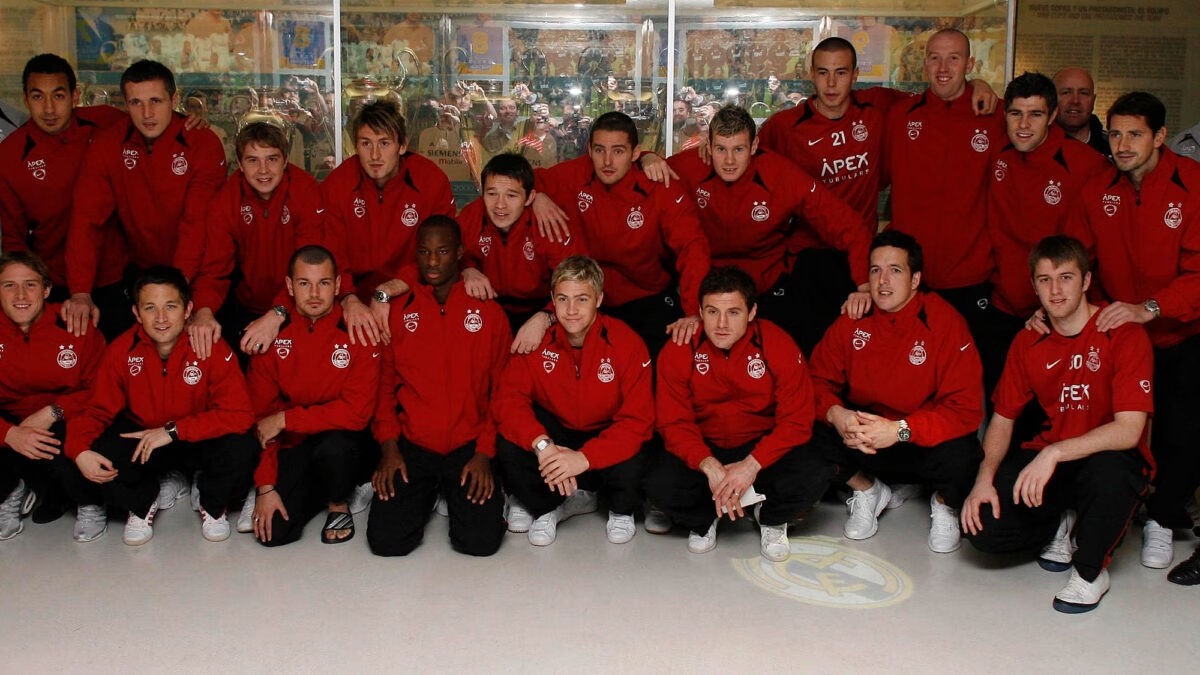
Derek Young and the euro run of 2007/08
The midfielder looks back at some of the Dons greatest European nights ...
We welcome PAOK here to Pittodrie this week for our second home game in the UEFA Conference League.
European group football is not entirely new to the old homestead. We have trod this path before, back in 2007/08 when the old UEFA Cup competition was dipping its way into the group stage waters.
It was a season of achievement in Europe that has perhaps never had its fair share of acclaim, overshadowed at the time, of course, by the golden days of Gothenburg – then only celebrating its silver anniversary and so much closer in terms of comparison – and by that season’s semi-final defeats in the domestic cup competitions. But in European competition that season, Aberdeen achieved something impressive, something that perhaps only now we can fully appreciate as we take on board the nature of the teams with which we competed.
Jimmy Calderwood’s side were pitted against real quality, from the opening qualifying game against Dnipro, through to our final defeat in the first knock-out game after we had given the mighty Bayern Munich another chasing here at Pittodrie. Derek Young was a member of Calderwood’s side and he remembers that year with particular fondness, and with a fair few stories to tell.
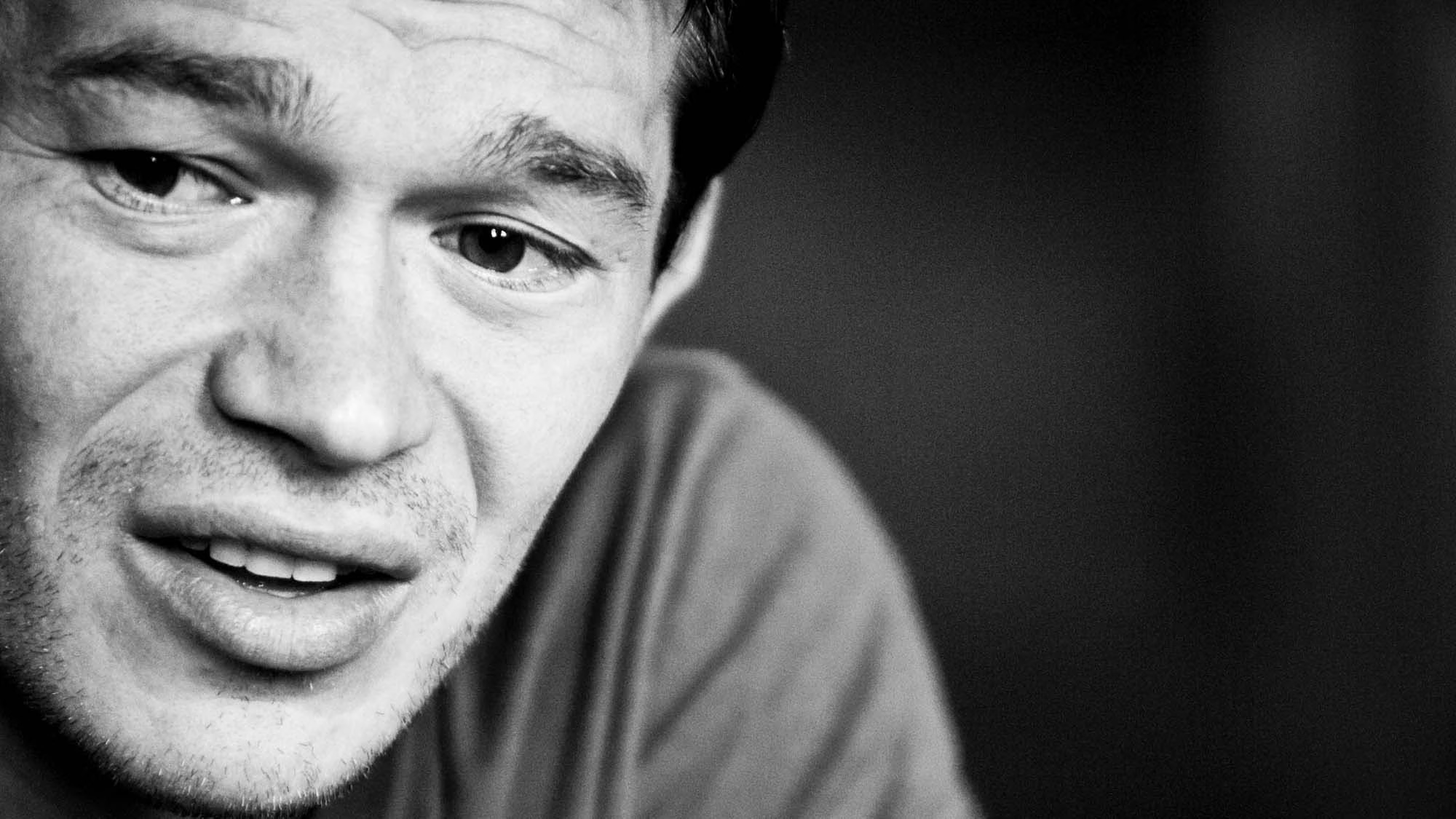
“We had a solid squad with game changers right the way through it. Jimmy Calderwood had been in at the club for a while by then and he had moulded what he wanted. The main spine of the team had been there for a number of years, boys like Scott Severin, Barry Nicholson, big Lee Miller up front, Jamie Smith – when he was fit, he was unplayable at times. I came back in the summer of 2007 and it was obvious what a good side he had put together.
“Jimmy set the team up well and most games that we would play, we would go and try to win. You’d sit in occasionally in certain games, but even then, with the players that he had, he knew he could counter-attack teams. You’d be holding on to your formation for a while, knowing fine well that you’ve got these extra players in the team with a bit of pace and creativity so that we could maybe catch teams out.
“When it came to the European games, you need that approach because most teams that we play in Europe, and especially at that standard back then, were very good at keeping hold of the ball. Of course, we never found out until after, but a lot of these teams that we played, half of their players were getting scouted from teams all over Europe. I think we got to the end of that season and there were three or four players from every team that we had played against who ended up getting a big money move to even bigger clubs, so it was high quality teams we were playing against.
“Jimmy was at Dunfermline and I was there with him, and he always looked to do things with the tactics, which was really useful in Europe. The year before I got there, they had played a game where they were getting beat 2-0 and he changed formation to two at the back. They just went for it because they were losing 2-0 – and they ended up getting beat five or six!
“But the following week, something similar happened, he changed the formation and went three against three at the back and they came back to win the game. As a player, when he changed things up like that, you’d got specific instructions. ‘This is why we’re doing this, I want you to mark him, but then as soon as we win the ball, that’s when our formation kicks in off the ball and we’ll attack a certain way.’ At least he was trying to do something different and it was nearly always geared to try and get a positive result.”
Just to get into the group stages, the Dons had to get past a qualifying round that saw them pitted against Dnipro from Ukraine, though at least back then, the qualifier didn’t roll around until mid-September, by which time Aberdeen had at least managed to get six league games behind them and were starting to find the season’s rhythm even if results hadn’t quite gone as we wanted.

In the first leg at Pittodrie, Dnipro were everything you would expect from a European side from their part of the world – well drilled, well organized and determined to give nothing away ahead of taking the time back home. Even so, Derek recalls that the Dons were a little disappointed with the 0-0 draw that was the final outcome.
“When we played Dnipro at home, we felt we should have got more out of the game. We knew they were a good team, they were decent on the ball, but they weren’t brilliant at Pittodrie. When we got the ball, we were really good that night. So when we went to play them away, because of how we played that night, we went with a bit of confidence.
“But it was a whole different thing playing at their stadium, it was so old, it was crumbling. Their fans were going crazy for the entire 90 minutes. Five minutes into the game I was thinking, ‘This is this is going to be a long night for us!’, because we couldn’t get near the ball. Michael Hart was playing behind me and I honestly I don’t think we passed the ball to each other all night, we were just tracking runners, passing them on, making sure everybody was in front of you.
“The big thing was that we got in front, after about half an hour. We got the goal from winning the ball back. Ricky Foster got himself down the line, and what Darren Mackie had been told was that as soon as we got the ball wide, just get yourself straight into the box, and for the other wide midfielder to get to the back post in case the cross went deeper.
“That actually worked out perfect because that’s what happened and Darren got the diving header – there’s a picture of him scoring and I’m charging in at the back post!
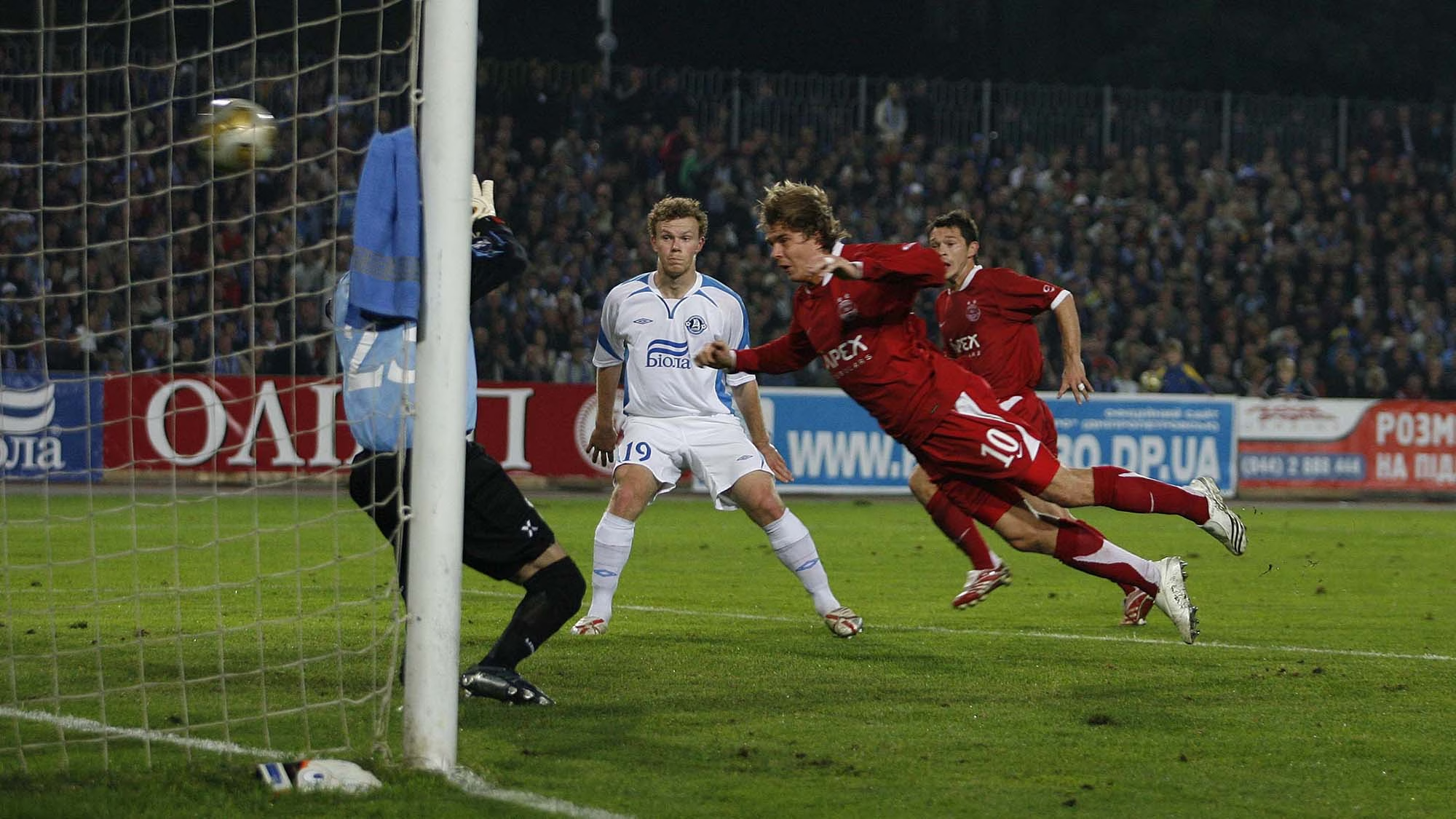
The goal meant that now we’d got something to hold on to. We got to half-time and everybody was just sitting in the changing room, just staring into space, because we knew what’s at stake, we knew we’d got a great chance, we’ve got 45 minutes to get through. The other side of it was that we’d not played any football!
“I think we had three counter-attacks in the game. They were absolutely brilliant on the ball. The guy who I was up against, that I’d played against at Pittodrie, there he just stayed behind the ball, but over there, it was as if he’s on a motorbike. He’s up and down this left hand channel and all I’m doing is passing him on to Michael and I’m taking his guy who’s coming inside the park. That’s all we did all night, just shouting at each other, passing players on.
“Halfway through the second half there was a break in play and I can just remember Barry Nicholson walking past and saying, ‘Have you touched the ball yet?!’ We were just laughing because that’s the way the game was, but we did the jobs that we needed to do, Langers had a great night in goal and we kept going and kept making life tough for them. They ended up scoring with 10 minutes to go or something and even then it wasn’t a good goal. Andy tried to clear it and it hit their boy and went in. But somehow, we got to the end and we went through.

“It was a great result because the next two years, everybody was going to Dnipro and buying players off them and I think looking back, we didn’t get the credit for that because at the time, nobody actually realised how good a team they were.
“I remember we got to the changing room afterwards and there were all these different kinds of seats in there, like a family Christmas party when you get all the chairs you can find from all over the house! I can remember a brown leather couch being in there. We were over the moon, we’d done something we didn’t think we would do in football, everyone was so excited and everybody was cheering, and then after a bit, it was kind of eerie. It went quiet because everybody was shot, just shattered, there was nothing left in anybody, it was just bodies lined up against walls, just lying flat out on this brown leather couch, just exhausted.
“It didn’t actually hit you properly until you’re sitting at the airport. The Aberdeen fans are all going crazy, everybody’s jumping on top of each other at the airport. And then you go and spend the next couple of hours on the plane, and you’re thinking, ‘We’ve done something unbelievable here, this is going to be the time of your life!’ As a footballer, you’re wanting to do these things, but sometimes you think it might be just a wee bit too far. But then when it happens, and then you’re in the group stage, it was incredible.”
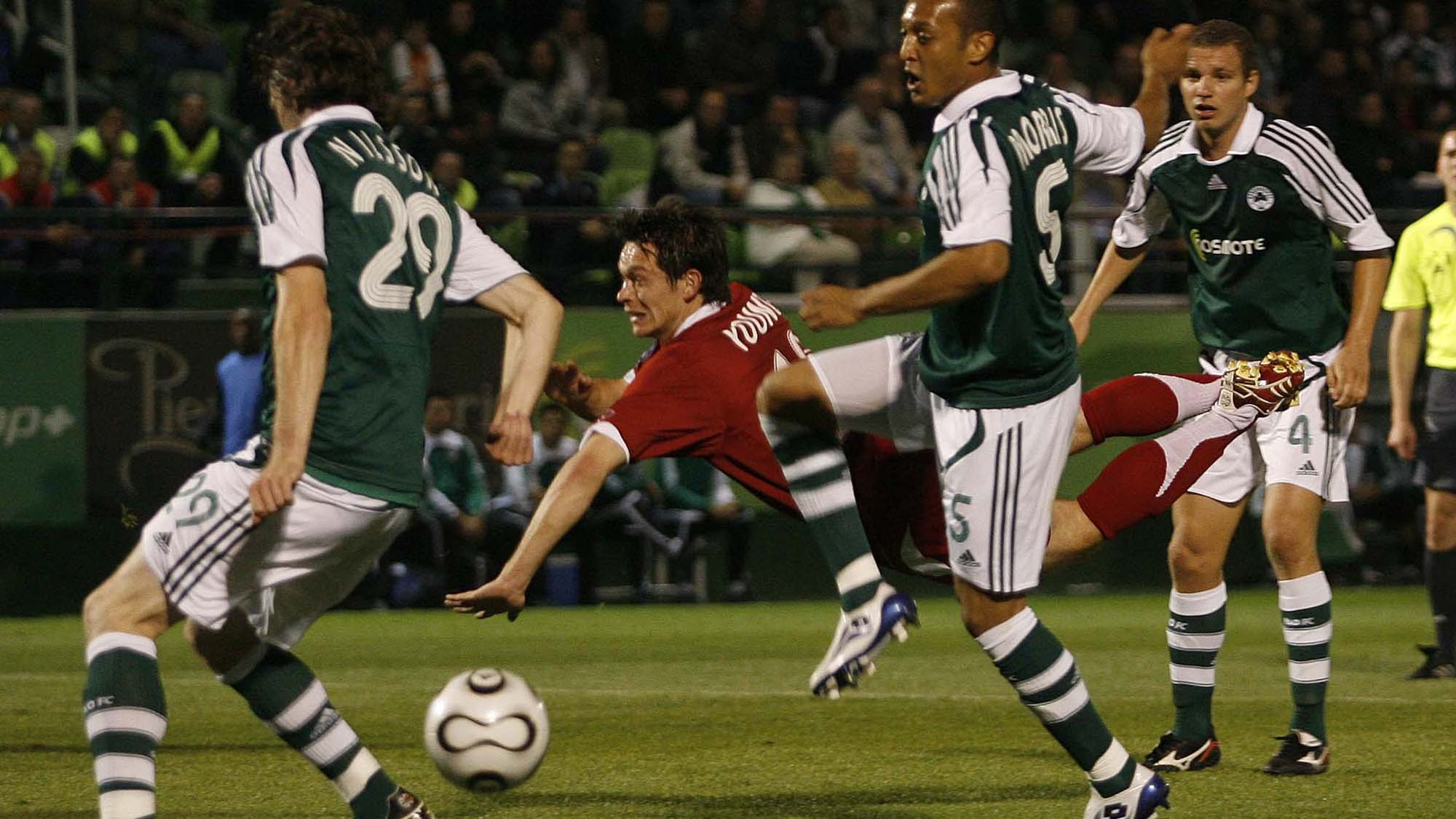
The group stages in the UEFA Cup were rather different then. Five sides were in each group, playing each other once only. You got two games at home, two away, and it was pot luck which was which. At the end of it all, three teams from the group qualified for the round of 32. The Dons were grouped with Panathinaikos, Lokomotiv Moscow, Atletico Madrid and Copenhagen, indicative if the strength of that year’s UEFA Cup that also included the likes if Tottenham, Everton, Hamburg, Zenit St Petersburg, Villarreal, Fiorentina, Bayer Leverkusen, Galatasaray, Anderlecht and, of course, Bayern Munich.
Things didn’t get off to the best start with a 3-0 defeat in Greece in the opening game and the Dons were then held to a 1-1 draw by a powerful Lokomotiv team, Zander Diamond’s opener equalized by Branislav Ivanovic who went on to join Chelsea the following January, while another Premier League success story of the future, Peter Odemwingie, was also in that team. There was disappointment that the Dons had earned just a point at home, but it kept them in the hunt amid a punishing fixture list, as Derek recalls.
“We were in everything that season, and we ended up losing two semi-finals, it was a really tough schedule. We had a good squad, but it wasn’t a huge squad. Nowadays, you’ve got sports science coming out your ears. You train now and sports science are all over it, you’ve got your heart monitor and whatever else. It’s, ‘Do this, do that, don’t be doing too much tomorrow, here’s all you have to do, don’t even train at 100%.’ That’s just how the whole world’s gone.
“Back then we never had that. We never had the sports science to tell us we were doing too much or not doing enough. If you’re a sub in the game, you go and do some running after the game, but sports science now tells you how far and how much and if you’ve only come on for five minutes, they’ll keep you there. They’ve got everything on an iPad and that tells them how much more running you need to go and do to top up, so you’re the same as the rest of the team. That’s how far forward that is. We never had anything like that, but you knew yourself, you know your body. You had to rest properly, try and eat the right things, but we were playing Thursday night in Europe and you would have a game on the Sunday, all the way up until Christmas.
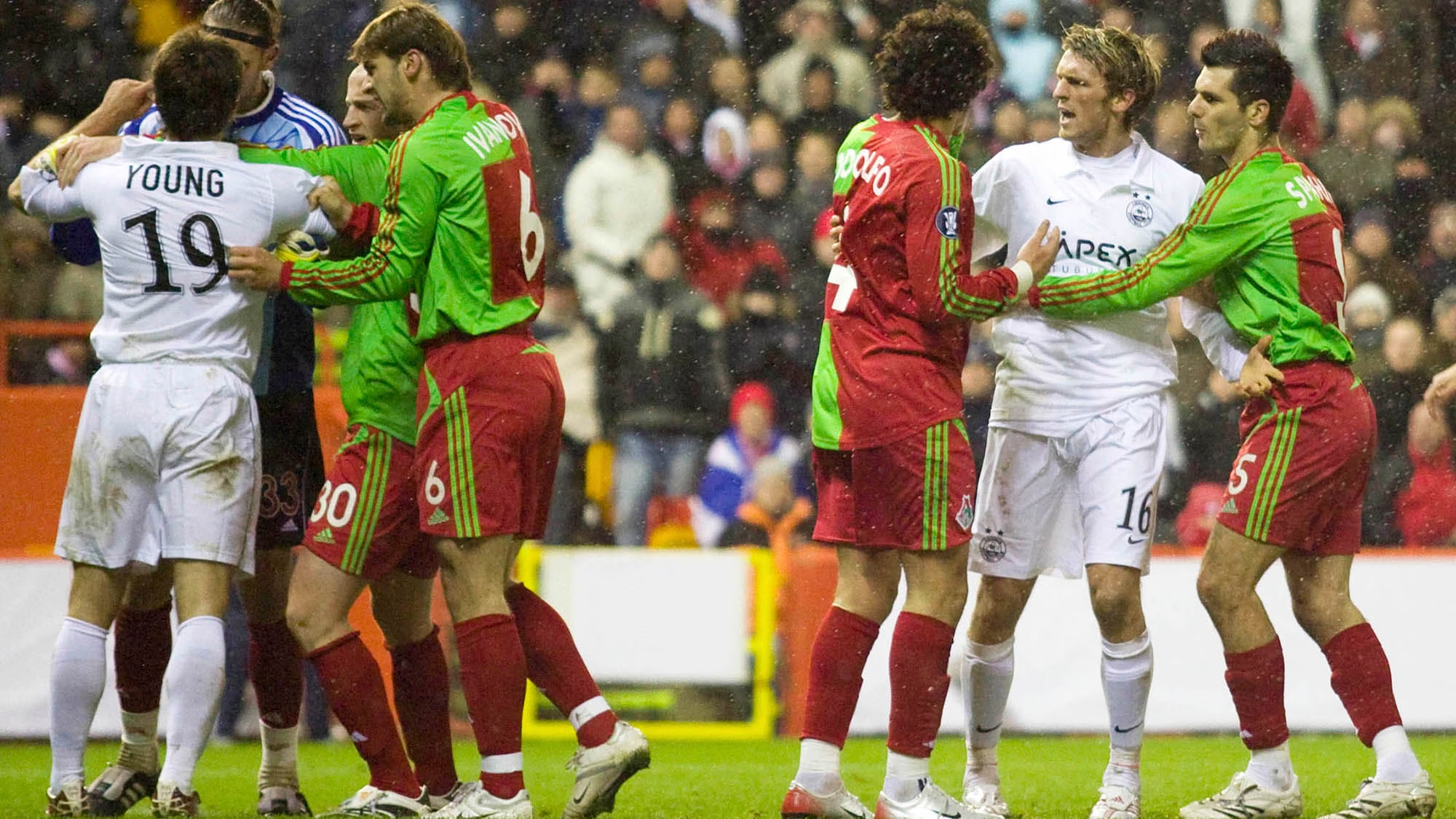
“I remember we played a European group game on the Thursday and then we played on the Sunday, and to say the boys were on their last legs was an understatement. We got in at half-time and we were the better team, but it was level, maybe against Hibs, I can’t remember. As we went off, people were booing. I can remember Jimmy Calderwood going off his head at the fans! We ended up winning, but that was the expectation when in truth, we were running on empty, we were playing so many games.
“We hardly trained properly from August straight up to Christmas, it was more just recovery stuff. You’d maybe get the day off after the game, the next day would be like a recovery day, you might play some wee games, get a rub, and then you’re preparing because you’ve got a game again and it’s not just any game, it’s a European game. There was all the travelling on top of that. And with Jimmy we travelled out a day early.
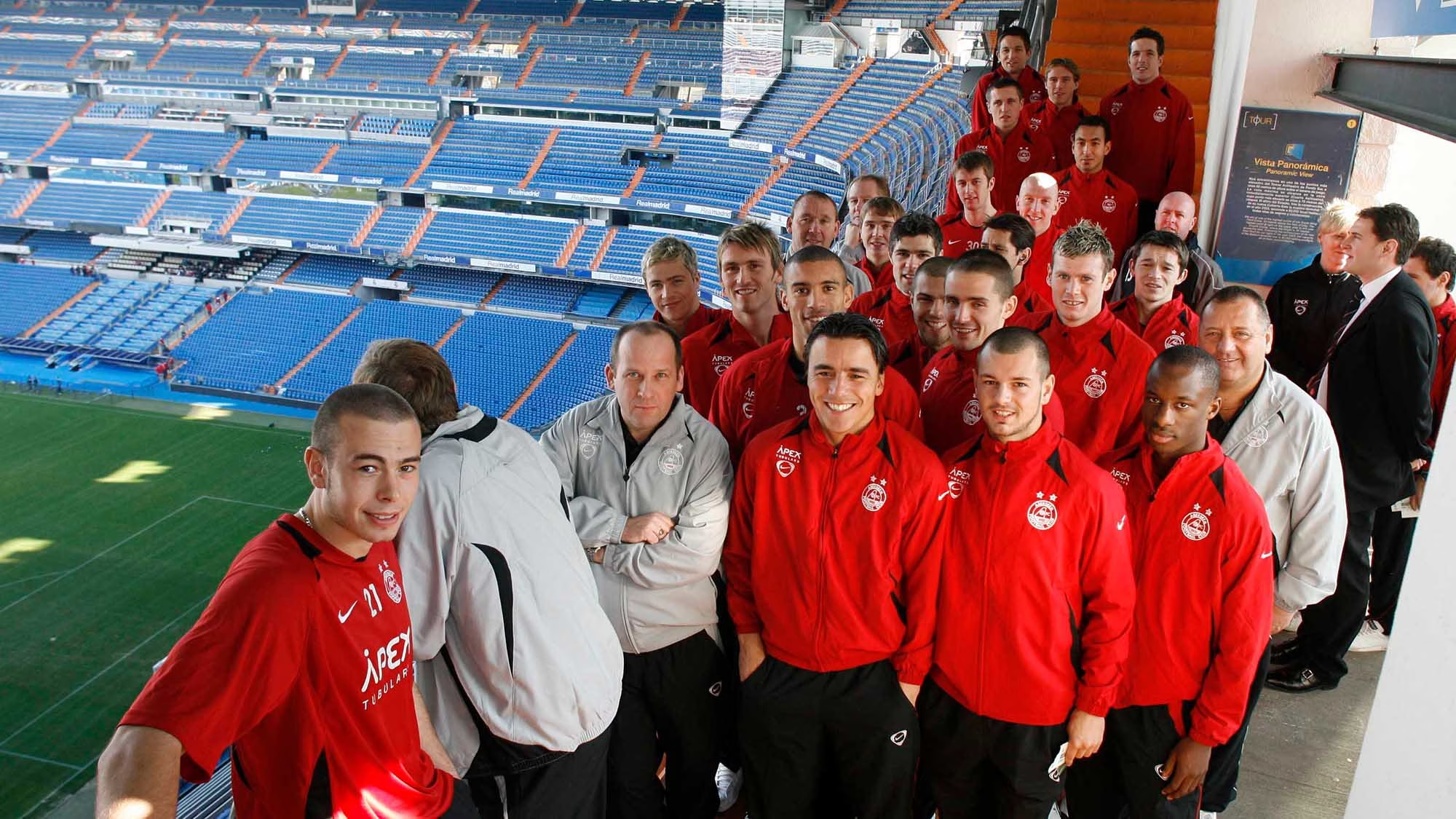
“As we got to Christmas, we’re still trying to keep up with everybody in the league, you don’t want to just drift off and just ignore that, because you really want to be in Europe the next year as well. There was a few weeks through that period where people were just running on fumes!”
Game three of the group was the real glamour tie, a trip to Spain to take on Atletico Madrid, one that lives long in Derek’s memory.
“People always ask me about the best game I played in. I was lucky enough to play at Hampden a load of times, I played in a Scottish Cup final and a League Cup final there in front of a full house and all of that, but my favourite game was Atletico Madrid away, just because of everything about it. The atmosphere was unbelievable from the minute we got there. The Aberdeen fans were hyper at the airport, there just seemed to be something about it that was extra special.
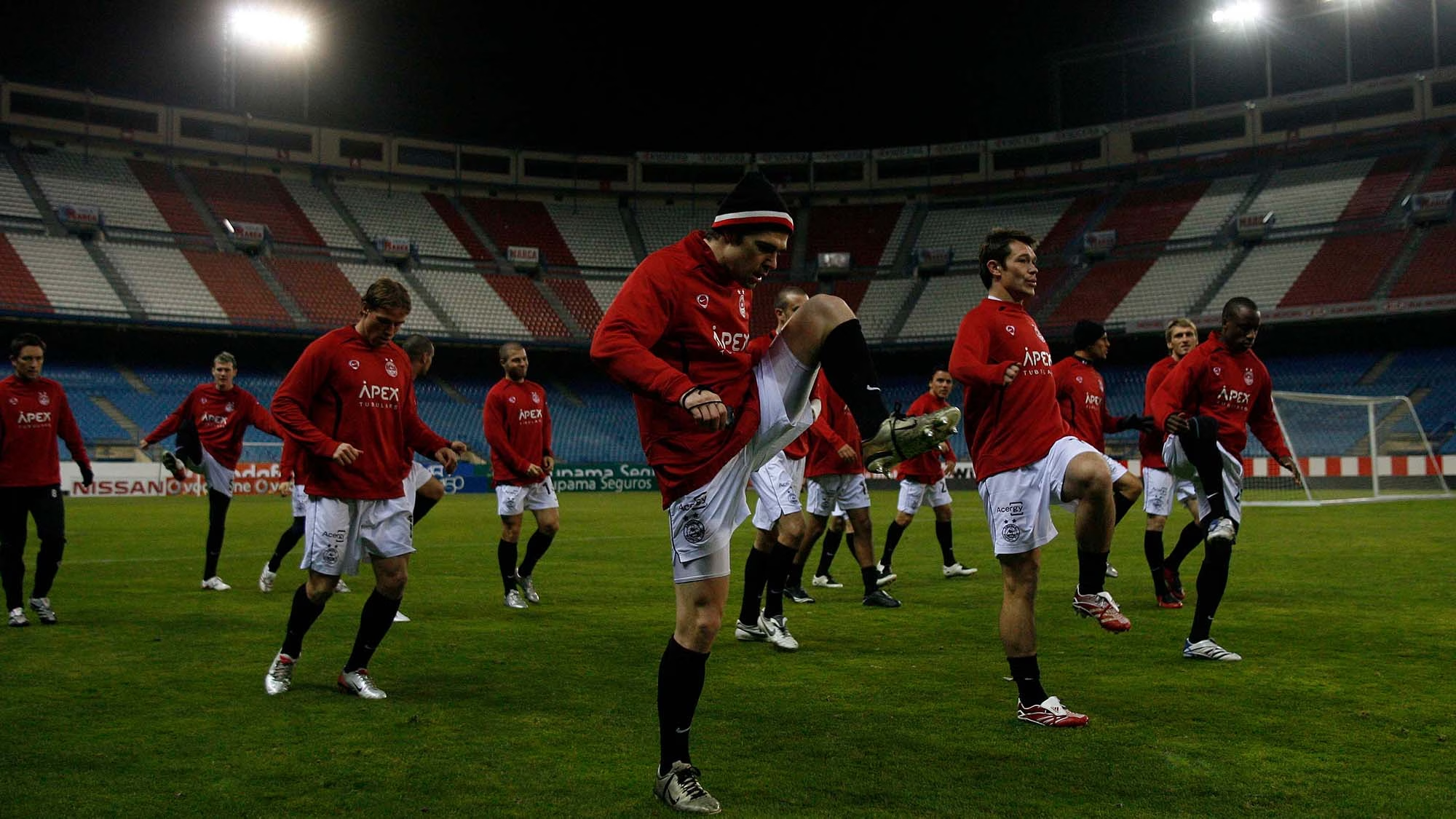
“We trained the night before and it was an old stadium, a well-known stadium throughout football, and you’re standing there in the middle of this pitch, training, waiting for the game the next day. I remember in the game, at one point in the second half, I think there was an injury and I can remember just standing there for about 10 seconds just looking around me thinking, ‘This is just incredible!’ The year before, I’d been at Partick Thistle, probably playing in the Challenge Cup, but you fast forward and I’m starting against Atletico Madrid in a European game!
“We turned up the next day, there was a full house, fireworks going off all over the place, smoke everywhere, everything was incredible. And then we were playing against Diego Forlan, Sergio Aguero, internationals all through the team. At the time, you realise how good they are, but really, it’s only when you look back a few years later that you see just how incredible it was that we’d got ourselves to that level.
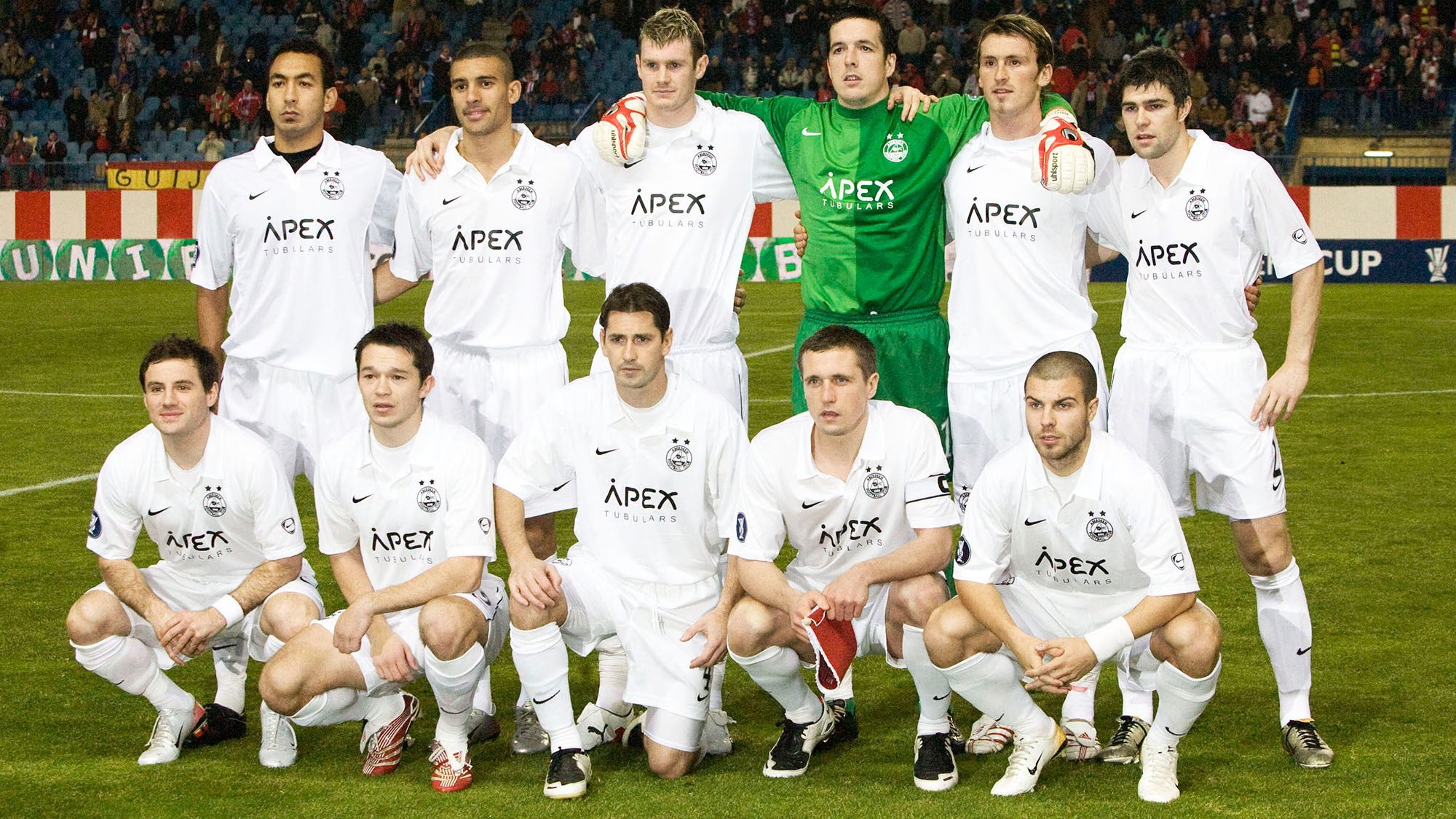
“The way Jimmy Calderwood and Jimmy Nicholl set up the team and the way they spoke to us calmed you down, it was very much about, ‘Here’s what we’re good at, here’s what we’re going to do.’ If they spoke about Aguero it was, ‘Aye, this guy’s good.’ But no more than that. ‘We’re gonna do our job and stick to what we our gameplan is.’
“It didn’t help that we didn’t have our full team, Lee Mair and Darren Mackie were missing, then there was a sickness bug that was going through the team. I think maybe about three or four three of us had it. I came in at half-time and I was sick as a dog in the toilet. I came back out and Jimmy was halfway through his team talk! He’s just looked at me, he’s obviously heard me in the toilet and he just looked at me and said, ‘Are you going to be alright son?’ I said I was fine, so he said, ‘That’s okay, just wanted to make sure!’
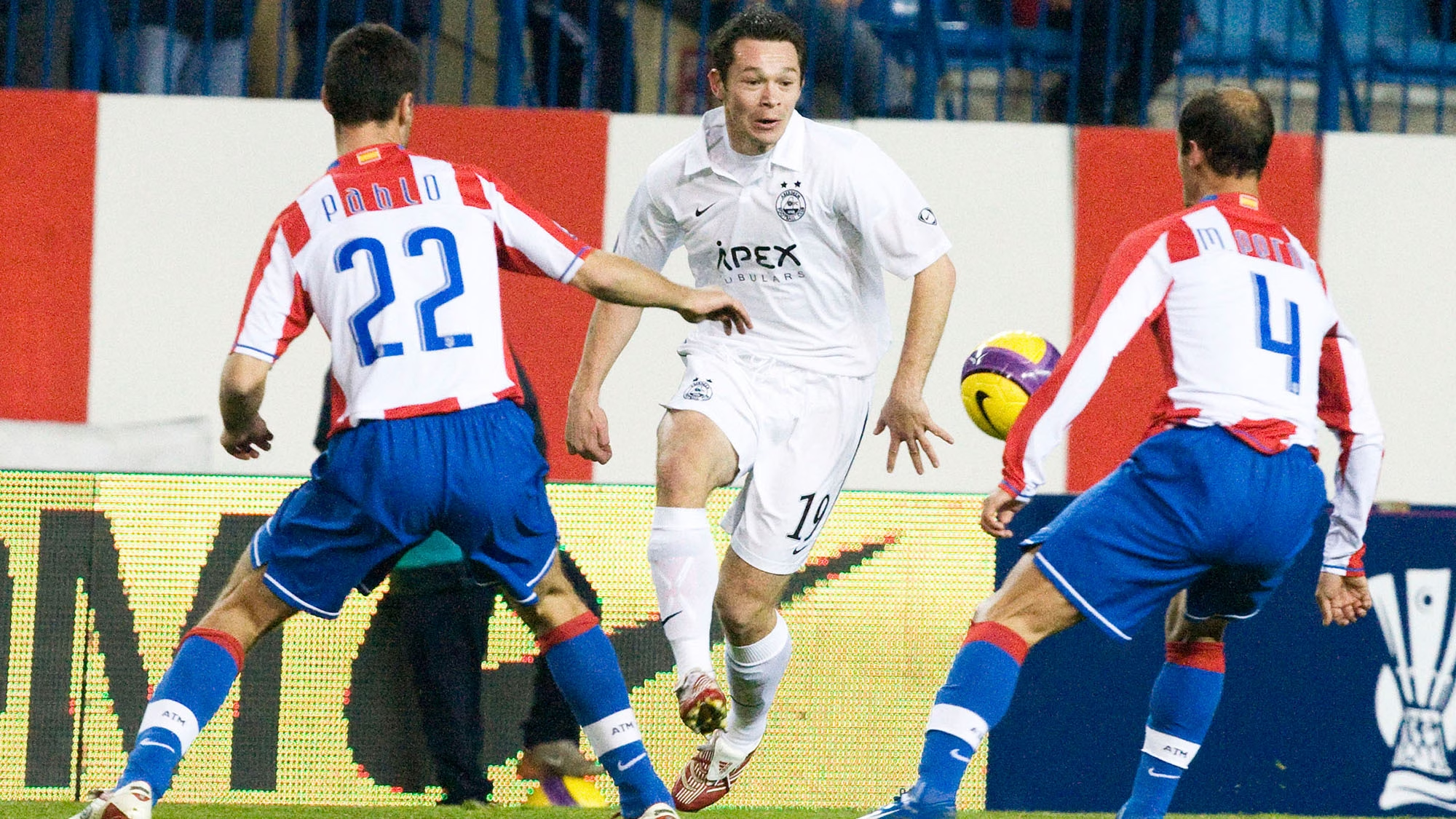
“I was in there to play on the right hand side, Jackie McNamara right behind me, then he got injured and Chris Clark came on after about half an hour. I can remember the start of the game, the instruction was, ‘Let’s keep it tight. Nothing stupid. Get the ball, keep hold of it, two or three quick passes, get us warmed up, get us up the park, stick balls up on the right hand side, left hand side.’ But they started the game and within two minutes they hit the bar, hit the post, somebody had missed a sitter. We’re all just kind of looking each other going, ‘Oh my God!’
“As soon as we lost the ball, they were just like the Red Arrows flying forward, but we managed to hold out until two minutes before half-time, and then they got a penalty. They were an incredible team and if you look back at it now and speak about the players that were on that pitch that we were playing against, to get beat 2-0 by a penalty and then an unbelievable free-kick into the top corner wasn’t bad. I think the reaction in the dressing room afterwards was more relief than anything that we’d not gone and taken a real pasting!”
In the end, everything came down to a final showdown with Copenhagen at Pittodrie, five days before Christmas. The Dons had to beat the Danes by at least two clear goals to progress to the knock-out phase, a tough ask, but possible. Then disaster struck Derek.
“I’d been enjoying probably the best season I’d had for a while. I came back to Aberdeen that summer and had to fight my way into the team, I stayed in the team, and then we had these European nights as well. Everything was going great for me. But we played Motherwell the Saturday before Copenhagen, and I did my knee and I was out for the next three or four months.
“But the results we’d got left us with a good chance at home against Copenhagen. Playing at Pittodrie you’ve got the backing of 20,000 fans. It was a night where something just felt different, even though I wasn’t playing. I was watching the boys warm up and Pittodrie was rammed, there was no space in the place from quarter past seven onwards, everybody had to be there. It was just madness. You had flags everywhere. They had set up some unbelievable banners around the place, just wild.
“We were in a box in the Main Stand watching the game. Towards the end, we had to get back to the dressing room before people started leaving and we’d get stuck in the Main Stand box. So we got down to the tunnel and when the final whistle went, the roof came off the place. Even though I wasn’t involved in the game, everything about it was unbelievable. Jamie Smith scored a couple of wonder goals but right across the team, that night showed just how good some of the players were.”
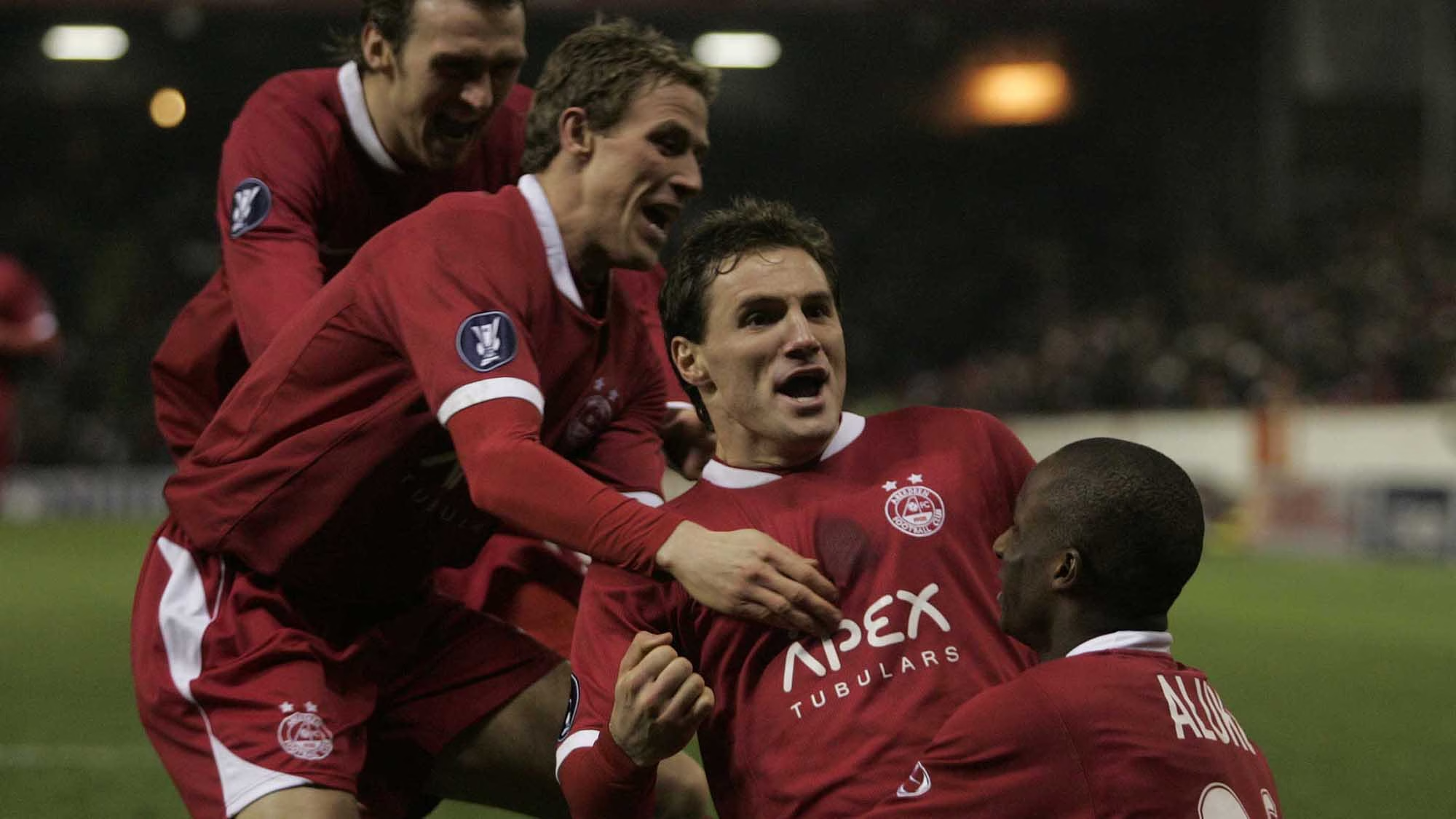
The postscript to qualification was of course Bayern Munich. Derek remembers the bittersweet nature of coming out against them in the next round.
“The draw was made and we were up in the Main Stand, in the 50 Club, watching it come through. I was injured, I wasn’t going to be involved, but I was still excited. It comes out as Bayern Munich, unbelievable. As we’re coming away, Jimmy Calderwood was there, smiling and laughing and I said to him, ‘Good luck finding a formation to beat them!’ He just burst out laughing!”
But that’s another story for another day…
